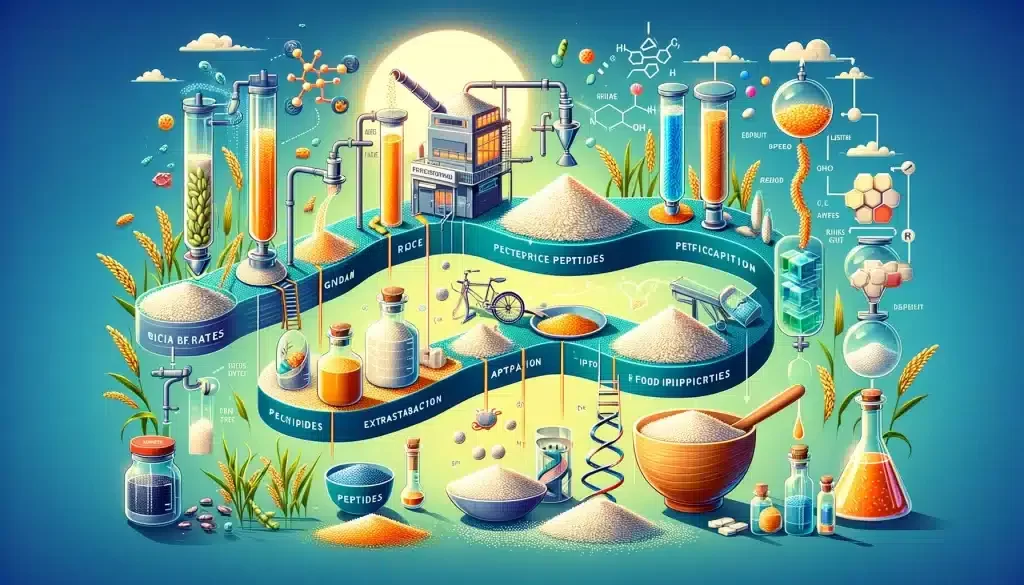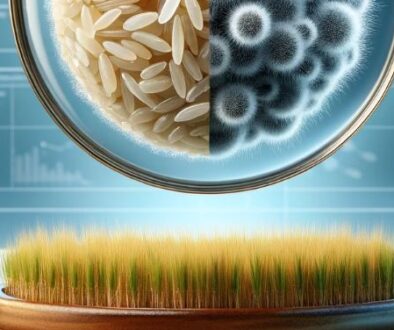Rice peptides and their research progress
Explore the latest advancements in rice peptides research, focusing on preparation, health benefits, and innovative food applications for enhanced nutrition.
Keywords: broken rice,starch sugar,bioactive peptide,rice peptide,rice protein,liver
protection
Preparation of Rice Peptides
Rice peptides are obtained by enzymatic hydrolysis, microbial fermentation, and a combination of microbial and enzymatic methods. Enzymatic hydrolysis is the most common method due to its simplicity, mild conditions, and the high quality of the resulting peptides. Different enzymes can produce rice peptides with various sequences and types. Fermentation methods offer longer process cycles and lower product stability but can enhance flavor. Various purification techniques, such as ion exchange, gel filtration chromatography, and reverse-phase high-performance liquid chromatography, are used to isolate and purify peptides with specific molecular weights and sequences. In China, the preparation and purification of antioxidant peptide segments have reached maturity, resulting in small molecule rice peptides with various functionalities, including antioxidant, blood pressure-lowering, and immune-activating properties.
Activity Research on Rice Peptides
Rice antioxidant peptides can scavenge excess free radicals, maintain the balance of the body’s oxidation system, and slow down aging. Research on rice antioxidant peptides is relatively mature, with peptides of 2 to 10 amino acid residues being identified for their ability to inhibit the oxidation of biomolecules in the body. These peptides are also applied in the cosmetics industry for their anti-aging and antioxidant properties. In Japan, significant research has focused on rice peptides, including ACE inhibitory peptides, which have led to the development of various products. Research in China has also optimized the extraction and purification of rice peptides with ACE inhibitory activity. Furthermore, rice antimicrobial peptides have been explored for their potential as feed additives for poultry to prevent diseases and promote growth, marking them as eco-friendly, non-toxic products. However, research on the hepatoprotective activity of rice peptides is limited, with most developments being in the realm of health food without systematic validation of their functions.
Application of Rice Peptides in Food
The bitterness and undesirable flavor of rice peptide powder, a result of hydrophobic amino acids in the peptide chain, have led to research on debittering and flavor improvement. Methods such as the use of leucine aminopeptidase for hydrolysis can effectively reduce bitterness. Additionally, adding flavor-masking materials like glycine, honey, citric acid, and stevia can produce low-bitterness rice protein peptide beverages with fast solubility and refreshing taste. Efforts to develop rice peptide drinks with good taste and health benefits have resulted in various rice peptide powder products with different functionalities, including those aimed at beverage applications, liver protection, and as food additives.
Research Objectives and Significance
China, being a major grain-producing country, generates over a hundred million tons of rice annually, with 10-20% of it being broken rice containing similar nutritional components to whole rice but with lower economic value. The poor texture of broken rice limits its use primarily to starch sugar production, with the by-product, rice dregs, containing a significant amount of protein used in high-protein feed or for producing protein hydrolysates. This study introduces the application of enzyme-linked microfiltration technology in the processing of broken rice, aiming to extract high-purity food-grade rice protein and rice peptides while enhancing the comprehensive utilization value of broken rice. This innovative processing route opens new avenues for the high-value utilization of broken rice, laying a foundation for the development of special health foods based on rice active peptides.
For more further detailed information of this research, feel free to contact our team for asssistance.
Original authors: Li Yinghui, Yuan Wenpeng (Qilu University of Technology, Jinan, 250353)
About ETprotein:
ETprotein, a reputable rice protein Chinese factory manufacturer and supplier, is renowned for producing, stocking, exporting, and delivering the highest quality organic bulk vegan protein and plant proteins. They include Organic rice protein, clear rice protein, pea protein, clear pea protein, pumpkin seed protein, sunflower seed protein, mung bean protein, etc. Our offerings, characterized by a neutral taste, non-GMO, allergen-free attributes, cater to a diverse range of industries. We serve nutraceutical, pharmaceutical, cosmeceutical, veterinary, as well as food and beverage finished product distributors, traders, and manufacturers across Europe, USA, Canada, Australia, Thailand, Japan, Korea, Brazil, and Chile, among others.
Our specialization includes exporting and delivering tailor-made protein powder and finished nutritional supplements. Our extensive product range covers sectors like Food and Beverage, Sports Nutrition, Weight Management, Dietary Supplements, Health and Wellness Products, and Infant Formula, ensuring comprehensive solutions to meet all your protein needs.
As a trusted company by leading global food and beverage brands and Fortune 500 companies, ETprotein reinforces China’s reputation in the global arena. For more information or to sample our products, please contact us and email sales(at)ETprotein.com today.












